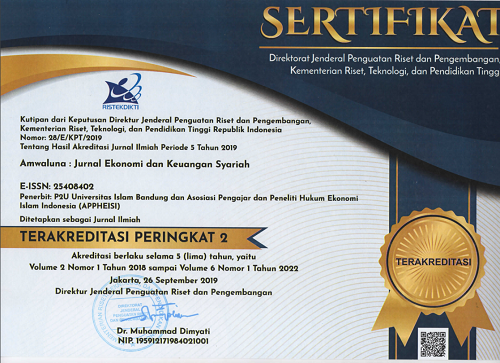THE ISLAMIC BASIC-VALUES OF SUSTAINABILITY IN THE MANAGEMENT OF WATER RESOURCES IN PASURUAN EAST JAVA
Abstract
This study aims to analyze the Islamic basic-values of sustainability in water resource management in Sumberrejo Village, Purwosari Sub-district, Pasuruan Regency, East Java, Indonesia. It was designed as a case study. The research subjects were the village officials, water resource managers, and water resource user communities. The data were collected through active participation, interview, observation, and documentation. In the data interpretation stage, this research employed the descriptive analysis method. The results showed that the Islamic basic-valuesof sustainability carried out by the people of Sumberrejo Village were that water management was a form of worship or obedience to Allah, gratefulness, fair distribution, balance (mizan), and care.
Keywords
Full Text:
PDFReferences
Adebayo, R. I. (2014). An Islamic perspective on sustainable economic development: Nigeria as a case study. In INTERNATIONAL JOURNAL OF ISLAMIC THOUGHTS (Vol. 3).
Al-Amusy, M. M., & Al-Atum, S. I. K. (2013). مشروعية الحمى وعلاقته بنزع الملكية -دراسة فقهية مقارنة. المجلة الأردنية في الدراسات الإسلام, 3(11), 475–488. https://repository.aabu.edu.jo/jspui/handle/123456789/971
Al-Kubaisy, S. F. (2011). أثر الوسطية التوزيعية في التوازن الاجتماعي. Journal of The Iraqi University, 26(3), 365–408. https://www.iasj.net/iasj/article/47503
Alousy, I. M. A., & Al-Harasyah, A. M. (2013). المقاصد الدلالية المستخفية لآيات الماء في القرآن الكريم. المجلة الأردنية في الدراسات الإسلامية, 11(2), 55–70. https://repository.aabu.edu.jo/jspui/handle/123456789/863
Connell, J. (2018). Islands: Balancing development and sustainability? Environmental Conservation, 45(2), 111–124. https://doi.org/10.1017/S0376892918000036
Djalaluddin, A. (2012). Perspektif Islam tentang Kepemilikan Negara atas Tambang di Indonesia. Universitas Brawijaya.
Fakhrina, A., Ahmad, M., & Basyir, M. (2013). Mengembangkan Kemitraan Pengelolaan Sumbrt Daya Air di Dukuh Kaliurang Desa Kembanglangit Kec. Blado Kab. Batang. Jurnal Penelitian, 9(2), 301–315. https://doi.org/10.28918/jupe.v9i2.145
Ghafory-Ashtiany, M. (2009). View of Islam on earthquakes, human vitality and disaster. Disaster Prevention and Management: An International Journal, 18(3), 218–232. https://doi.org/10.1108/09653560910965600
Hardjono, Astuti, N. D., & Widiputranti, C. S. (2013). Model Pengelolaan Air Bersih Desa di Bantul Yogyakarta. Jurnal Komunitas: Research & Learning in Sosiology and Anthropology, 5(2), 185–196. https://doi.org/10.15294/komunitas.v5i2.2737
Harmancioglu, N. B., Barbaros, F., & Cetinkaya, C. P. (2013). Sustainability Issues in Water Management. Water Resources Management, 27(6), 1867–1891. https://doi.org/10.1007/s11269-012-0172-4
Hasan, L. (2002). Revisiting Commons-Are Common Property Regimes Irrational? Revisiting Commons-Are Common Property Regimes Irrational? Munich Personal RePEc Archive, 1–23.
Hefny, M. A. (2009). Water Management Ethics in The Framework of Environmental and General Ethics: The Case of Islamic Water Ethics. In M. R. Llamas, L. M. Cortina, & Aditi Mukherji (Eds.), Water Ethics (pp. 25–44). CRC Press. https://books.google.co.id/books?hl=id&lr=&id=x_HAd7x8d6MC&oi=fnd&pg=PA25&dq=Hefny,+M.+A.+(2009).+Water+management+ethics+in+the+framework+of+environmental+and+general+ethics:+The+case+of+Islamic+water+ethics.+&ots=4tmdU582_O&sig=4dXu_D3AErKKB3FcwdWksadSR
Husein, A. N. (2019). سؤال وجوابه عن حديث ( الناس شركاء في ثلاث) للسيد محمد بن إسماعيل الأمير الصنعاني رحمه الله (ت1182هـ). Journal Islamic Sciences College, 1(60), 13–41.
Jusoff, K., & Alam, S. (2011). Environmental Sustainability: What Islam Propagates. World Applied Sciences Journal, 12(Special Issue on Creating a Knowledge Based Society), 46–53. https://www.researchgate.net/publication/268184247
Lings, M. (1968). The Qoranic Symbolism of Water. Studies in Comparative Religion, 2(3), 1–6. www.studiesincomparativereligion.com
Mansoor, A. I. (2016). Efficiency and Justice in Income Distribution - Necessary and Sufficient Conditions and The Islamic Economic Model. Journal of King Abdulaziz University, Islamic Economics, 29(3), 1–26. https://doi.org/10.4197/Islec.29-3.5
Maser, C. (1998). Vision and Leadership in Sustainable Development. CRC Press. https://books.google.co.id/books?hl=id&lr=&id=jHF1Ql-fLhgC&oi=fnd&pg=PR11&ots=nAXxJfuNUo&sig=kka3SqDIdSveOHLbKSSVwm1ZWoQ&redir_esc=y#v=onepage&q&f=false
Matali, Z. H. (2012). Sustainability in Islam. In R. Clugston & S. Holt (Eds.), Exploring Synergies between Faith Values and Education for Sustainable Development (pp. 35–38). Earth Charter International and Earth Charter Center for Education for Sustainable Development. http://ww.earthcharter.orghttp//www.upeace.org
Mawardi. (2014). Air Dan Masa Depan Kehidupan. Tarjih: Jurnal Tarjih Dan Pengembangan Pemikiran Islam, 12(1), 131–141. https://jurnal.tarjih.or.id/index.php/tarjih/article/view/86/87
McKay, J. E. (Editor). (2013). Integrating Religion Within Conservation: Islamic Beliefs and Sumatran Forest Management-A Darwin Initiative Case Study. http://kar.kent.ac.uk/contact.html
Mizrahi, M. (2020). The case study method in philosophy of science: An empirical study. Perspectives on Science, 28(1), 63–88. https://doi.org/10.1162/posc_a_00333
Naiman, R. J. (1992). New Perspectives for Watershed Management: Balancing Long-Term Sustainability with Cumulative Environmental Change. In Watershed Management (pp. 3–11). Springer New York. https://doi.org/10.1007/978-1-4612-4382-3_1
Putra, D. F., & Wardani, N. R. (2017). Evaluasi Keberlanjutan Sistem Pengelolaan Sumberdaya Air “HIPPAM” pada Masyarakat Desa Pandanrejo Kecamatan Bumiaji, Batu Jawa Timur. Jurnal Pendidikan Geografi: Kajian, Teori, Dan Praktek Dalam Bidang Pendidikan Dan Ilmu Geografi, 22(1), 22–31. https://doi.org/10.17977/JPG.V22I1.378
Radpour, E. (2019). Symbolism of Water in Daoism: A Sufi Point of View. Studies in Comparative Religion, 2(3), 6–21. http://www.javidankherad.ir/article_85277_6d39397f8c2321e55ad162eaea375aa1.pdf
Santoso, M. A. F. (2014). Air Dan Pemeliharaannya Dalam Perspektif Islam. Tarjih: Jurnal Tarjih Dan Pengembangan Pemikiran Islam, 12(1), 97–113. https://www.jurnal.tarjih.or.id/index.php/tarjih/article/view/84
Siraj, M. A., & Tayab, M. A. K. (2017). Water in Islam. In M. S. Raju K. (Ed.), Water and Scriptures (pp. 15–58). Springer International Publishing. https://doi.org/10.1007/978-3-319-50562-6_2
Society, P. (2016). Keberlanjutan dan Aspek Pengetahuan Lokal pada Pengelolaan Sumber Daya Air Berbasis Desa oleh Warga Desa Uiasa, Kecamatan Semau, Kabupaten Kupang - Neliti (Policy Brief #6). https://www.neliti.com/publications/316/keberlanjutan-dan-aspek-pengetahuan-lokal-pada-pengelolaan-sumber-daya-air-berba
Sukarni. (2014). Air Dalam Perspektif Islam. Tarjih: Jurnal Tarjih Dan Pengembangan Pemikiran Islam, 12(1), 115–129. https://jurnal.tarjih.or.id/index.php/tarjih/article/view/85/86
Sulphey, M. M. (2019). The Islamic perspective of environmental sustainability and management. Middle East J. of Management, 6(5), 536. https://doi.org/10.1504/mejm.2019.101919
Thahir, M. Y. (2021). الماء في القرآن الكريم دراسة موضوعية. مجلة الجامعة للدراسات الإسلامية-IUGJEPS, 29(1), 263–286. https://journals.iugaza.edu.ps/index.php/IUGJIS/article/viewFile/8054/3527
Tilbury, D., Stevenson, R. B., Fien, J., & Schreuder, D. (2002). Education and Sustainability Responding to the Global Challenge. http://antwrp.gsfc.nasa.gov/apod/ap001127.html
Zafar, S. (2019). Environmental Sustainability in Islam. EcoMENA Echoing Sustainability in MENA. https://www.ecomena.org/sustainability-islam/
DOI: https://doi.org/10.29313/amwaluna.v5i2.5934
Refbacks
- There are currently no refbacks.
Editorial Office:
Syariah Faculty, Universitas Islam Bandung
Jalan Tamansari No. 24-26 Kota Bandung

Amwaluna : Jurnal Ekonomi dan Keuangan Syariah is licensed under a Creative Commons Attribution-NonCommercial-ShareAlike 4.0 International License.








